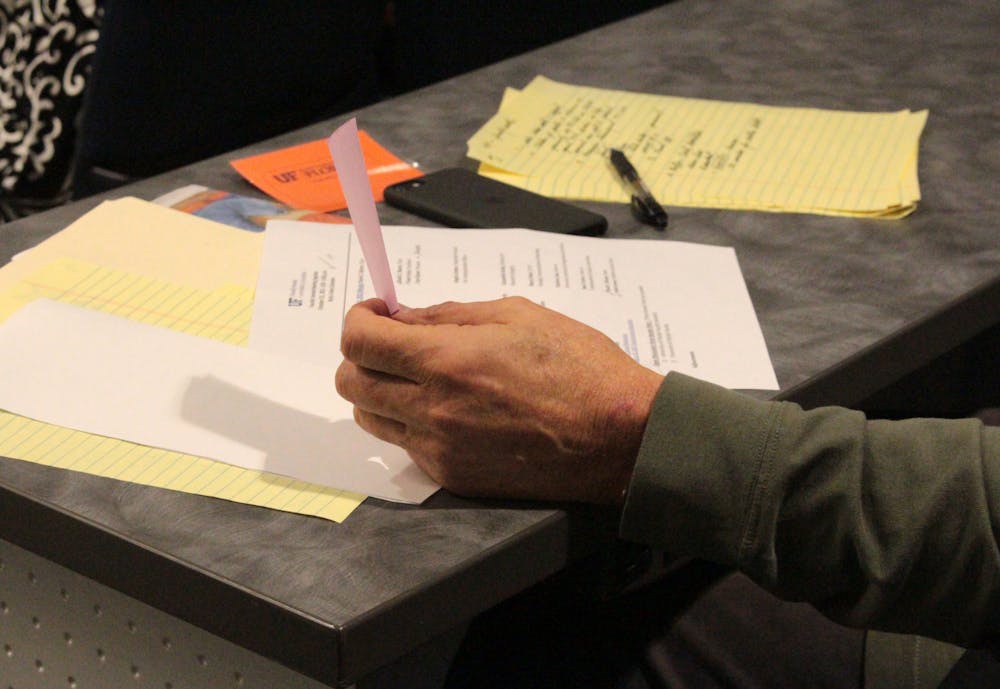UF Faculty Senators passed a resolution of ‘no-confidence’ Thursday in UF President Kent Fuchs’ handling of the COVID-19 pandemic after three months of concerted effort.
First drafted in August, the resolution detailed UF faculty and staff’s dissatisfaction with the state’s and university administration’s COVID-19 policies. Faculty concerns have ranged from in-person teaching requirements without social distancing or masking and vaccination requirements to the school’s lack of flexibility to accommodate at-risk faculty.
The resolution passed with a 70-31 vote. The vote does not determine if anyone in the administration is fired. It states that the faculty and staff have no confidence in UF’s leadership — a rare agreement among faculty to publicly scold the administration.
The resolution was first introduced to the faculty senate as an item to vote on in a meeting Oct. 21, but the senate voted to not pass it.
Prior to the vote, President Fuchs delivered a report explaining how the COVID-19 transmission rate is low in the community and in Florida compared to other states across the country like California, Texas and New York.
As the faculty senate moved to address the ‘no-confidence’ resolution, UF Faculty Senate Chair David Bloom said the Senate Steering Committee unanimously voted the ‘no-confidence’ resolution down.
In addition to Bloom being the faculty senate chair, he also sits on the board of trustees making him part of the administration being scrutinized by the ‘no-confidence’ vote.
The steering committee, headed by Bloom, is an administrative body. It serves as the executive committee of the faculty senate, determining the agenda for each senate meeting.
The committee determined the resolution was redundant and failed to provide a path forward or solutions to improve the university’s policies, he said.
Bloom then opened the floor for the senators to discuss, where many expressed the necessity to pass the resolution to hold the administration accountable.
“Maybe some language is redundant, but it’s not a redundant voice and yesterday we learned that,” a faculty member said. “We passed two resolutions yesterday, one was from the [Advisory Council of Faculty Senate] and one was from the faculty senate, so I believe this is our voice whether you support it or not.”
Hannah Vander Zanden, an assistant professor in the Biology department at UF, then called for a motion to vote using paper ballots, which let senators vote anonymously.
According to UF Faculty Senate’s bylaws, at least 20 senators need to vote in favor of the motion for it to pass. Over 30 faculty senators voted in favor of using signed written ballots.
The faculty senate continued addressing the rest of the action and information items on the agenda as the votes were counted. Bloom interrupted the meeting to state the resolution had passed before quickly returning to the meeting.
Mark Hostetler, a professor and extension specialist in the UF Wildlife Ecology and Conservation Department, said he has mixed feelings about the vote. He is worried about how the university can move forward and prepare for a possible COVID-19 surge this year.
“With everything that’s happened over the last few months, faculty are very concerned about academic freedom and academic governance,” he said.
However, Hostetler said even though UF was hamstrung by politics, UF Health and the hundreds of people working on UF Screen Test and Protect, have done an amazing job to keep UF safe as possible.
UF spokesperson Steve Orlando said he agrees with Hostetler’s sentiment as UF Health employees and students have kept the university safe over the past 20 months.
Orlando said the university will continue to follow state and federal mandates and laws regarding health policies and protocols and urges everyone to be fully vaccinated, including with the now-available booster shots.
Hostetler also said there is a prominent issue with the process of how the UF Faculty Senate runs.
“There is sadness in the faculty that this collegiality, this ability to speak our minds, whether you’re tenured or untenured is being stressed,” he said. “I’ve been here for 20 years, this is the highest point of stressors.”
The faculty senate met for an emergency meeting Wednesday regarding UF’s decision to bar professors from providing expert testimony. It voted on the academic freedom resolution, which asked UF for an outside investigation into the matter.
That resolution took two weeks to form and pass, whereas the ‘no-confidence’ resolution took almost three months.
Hostetler said he blames the Faculty Senate Chair Bloom as he could have pushed for the resolution to be addressed earlier.
He said, as faculty, they should consider removing the president, the provost and anyone in the general counsel from any of the committees. The reason being that some faculty are scared of retaliation from administration.
“To have them at our faculty meetings, in our Steering Committees, puts a chilling effect on people to speak their voice, and that’s unfortunate,” Hostetler said.
Contact Camila Pereira at cpereira@alligator.org. Follow her on Twitter @CamilaSaPereira.

Camila is a third-year journalism student and the administration reporter on the university desk. When she is not reporting for The Alligator, Camila is always listening to music and probably drinking honey milk tea.






